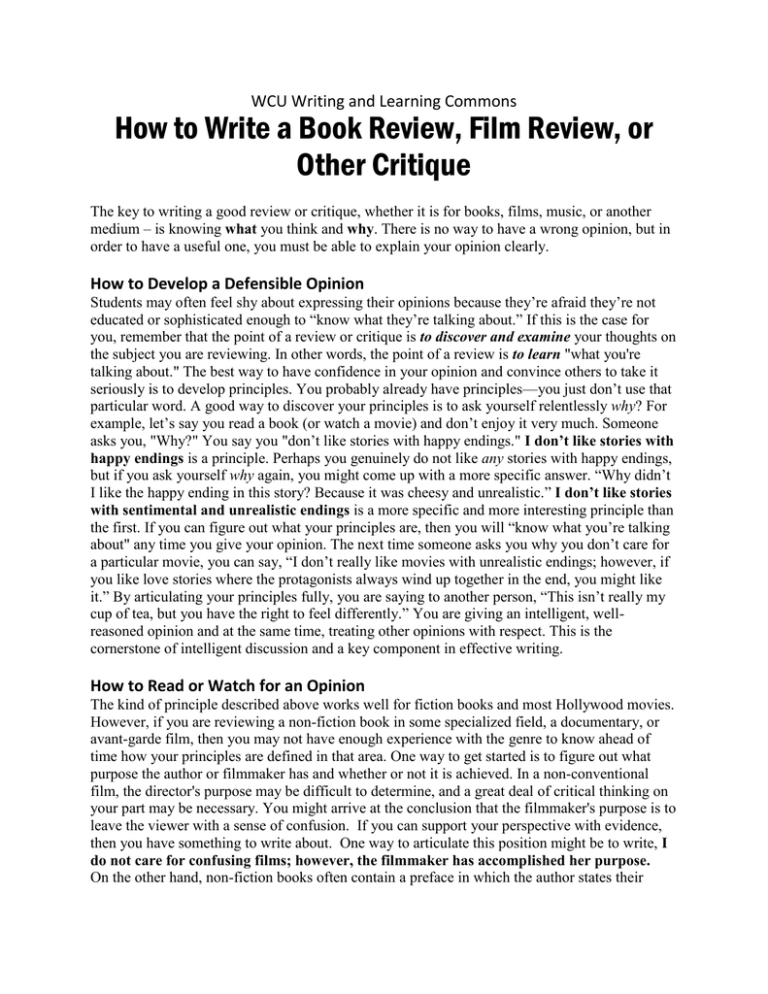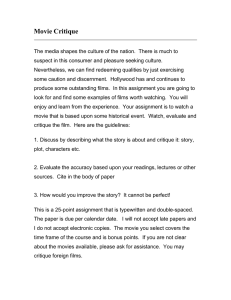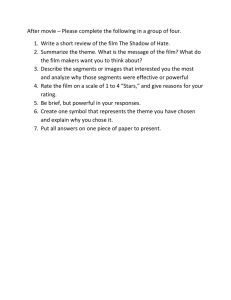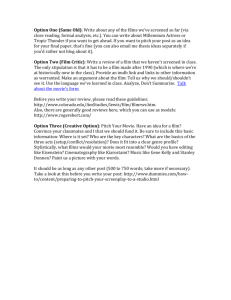How to Write a Book Review, Film Review, or Other Critique
advertisement

WCU Writing and Learning Commons How to Write a Book Review, Film Review, or Other Critique The key to writing a good review or critique, whether it is for books, films, music, or another medium – is knowing what you think and why. There is no way to have a wrong opinion, but in order to have a useful one, you must be able to explain your opinion clearly. How to Develop a Defensible Opinion Students may often feel shy about expressing their opinions because they’re afraid they’re not educated or sophisticated enough to “know what they’re talking about.” If this is the case for you, remember that the point of a review or critique is to discover and examine your thoughts on the subject you are reviewing. In other words, the point of a review is to learn "what you're talking about." The best way to have confidence in your opinion and convince others to take it seriously is to develop principles. You probably already have principles—you just don’t use that particular word. A good way to discover your principles is to ask yourself relentlessly why? For example, let’s say you read a book (or watch a movie) and don’t enjoy it very much. Someone asks you, "Why?" You say you "don’t like stories with happy endings." I don’t like stories with happy endings is a principle. Perhaps you genuinely do not like any stories with happy endings, but if you ask yourself why again, you might come up with a more specific answer. “Why didn’t I like the happy ending in this story? Because it was cheesy and unrealistic.” I don’t like stories with sentimental and unrealistic endings is a more specific and more interesting principle than the first. If you can figure out what your principles are, then you will “know what you’re talking about" any time you give your opinion. The next time someone asks you why you don’t care for a particular movie, you can say, “I don’t really like movies with unrealistic endings; however, if you like love stories where the protagonists always wind up together in the end, you might like it.” By articulating your principles fully, you are saying to another person, “This isn’t really my cup of tea, but you have the right to feel differently.” You are giving an intelligent, wellreasoned opinion and at the same time, treating other opinions with respect. This is the cornerstone of intelligent discussion and a key component in effective writing. How to Read or Watch for an Opinion The kind of principle described above works well for fiction books and most Hollywood movies. However, if you are reviewing a non-fiction book in some specialized field, a documentary, or avant-garde film, then you may not have enough experience with the genre to know ahead of time how your principles are defined in that area. One way to get started is to figure out what purpose the author or filmmaker has and whether or not it is achieved. In a non-conventional film, the director's purpose may be difficult to determine, and a great deal of critical thinking on your part may be necessary. You might arrive at the conclusion that the filmmaker's purpose is to leave the viewer with a sense of confusion. If you can support your perspective with evidence, then you have something to write about. One way to articulate this position might be to write, I do not care for confusing films; however, the filmmaker has accomplished her purpose. On the other hand, non-fiction books often contain a preface in which the author states their 2 intent. If your author’s purpose—as indicated in the preface—is to educate the reader about bipolar depression, and the author spends most of the book talking about unipolar depression, then the author has not met her goal. Gauging how well the creator has achieved their goal is the best way to write a fair review, even if you hate the book or movie you are reviewing. You have the right to the principle I don’t like books about psychology or I don't like avant-garde films, but if your assignment is to write a psychology book review or a critique of an avant-garde film, then the I-don’t-like principle won’t get you very far. If you say instead, I can respect books or movies in which the creator clearly states their purpose and then accomplishes it, even if I don’t give a rip about the subject matter, then you have somewhere to go with your review. Your Opinion Is Best Defended With Evidence--So Take Notes As you read your book, make a note of the sentences and phrases that best illustrate your opinion. If you are reviewing a film, make notes of the scenes that affect you the most. Study the image on the screen carefully and analyze what you see. Note any dialogue that seems to be especially significant. One of the most common student complaints is that their assigned work is "boring" or that they “don’t understand it." If this happens to you, think about your book or movie from these perspectives: When I say boring, do I mean unfamiliar? or, When I say boring, do I mean that this somehow makes me uncomfortable? If you find that a book is boring, slow down. You might be missing something, and you will want your review to be as fair as possible. However, pointless books have indeed been published, and it may have been your misfortune to encounter a book that is indeed “boring.” Consider, though, how the content might line up with the author’s purpose. If the author’s intent was to educate readers about bipolar depression, and their book is nothing but an endless parade of statistics, then they probably haven’t educated anyone, because she hasn’t presented her material in an accessible manner. If, however, the purpose of the book was to publish the statistics of bipolar depression occurring in the US during a certain time period, then the author has probably met her goal, which was simply to provide data. Whatever your opinion may be, the best way to back it up is to provide examples. If you provide a quote illustrating the kind of language you find dense and impossible to understand, or describe a scene that strikes you as overdone and silly, then your reader will be better equipped to judge your opinion. …composed by Brittany Harrison, in collaboration with Barbara Hardie, How to Write a Book Review, Film Review, or Other Critique, 2002, University Writing Center, Western Carolina University. Revised by the Writing and Learning Commons, 2012.





